It is too early to say whether England’s remaining coronavirus restrictions will be lifted on June 21, Matt Hancock told MPs as case rates rose in more areas of the UK than at any point since early January.
The Health Secretary said he was confident that “one day soon freedom will return”, with the latest data suggesting vaccines were protecting people against the Delta variant first identified in India.
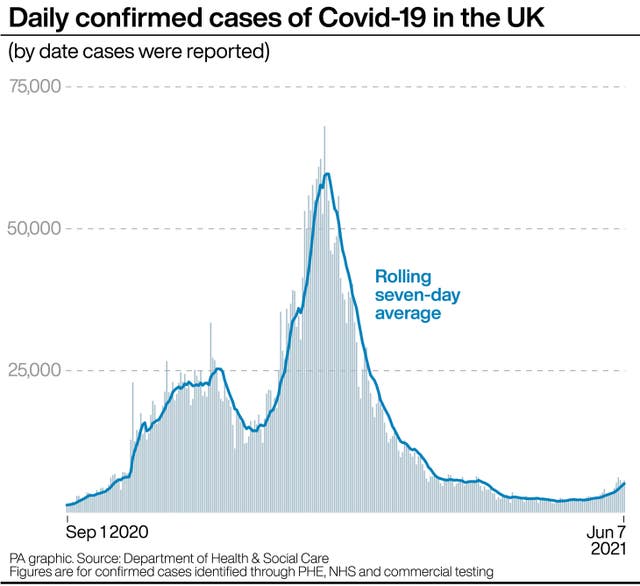
But he said a decision on moving to Step 4 of the road map would be delayed as long as possible, with a final announcement to be made next Monday – a week before any changes could come into effect.
Downing Street said there was “nothing in the data” to suggest a delay would be needed.
Mr Hancock confirmed that over-25s in England will be invited to receive jabs from Tuesday as the Delta variant “made the race between the virus and this vaccination effort tighter”.
The variant is thought to be 40% more transmissible than the Alpha variant first seen in Kent which swept across the UK over the winter peak.
But he said the vaccine was breaking the previously “rock solid” link between infections and hospital admissions.
As of June 3, from 12,383 cases of the Delta variant 464 went on to present at emergency care and 126 people were admitted to hospital.
Of those admitted, 83 were unvaccinated, 28 had received one dose and three had received both doses of the vaccine, Mr Hancock said.
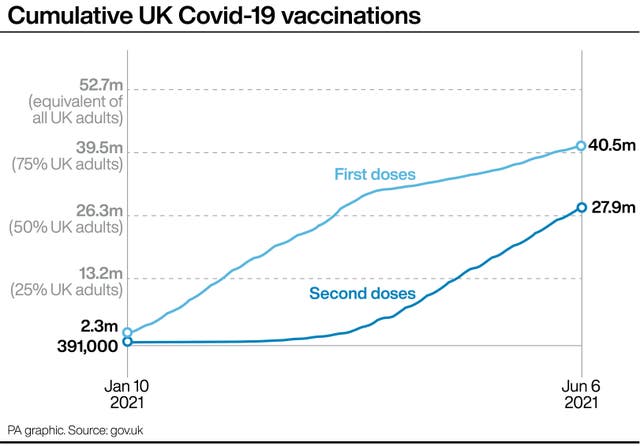
“The jabs are working, we have to keep coming forward to get them and that includes vitally that second jab which we know gives better protection against the Delta variant,” the Health Secretary said.
The spread of the Delta variant has seen cases increase in almost all parts of north-west England, London and Scotland.
The rise in rates has yet to be mirrored by a steady increase in hospital cases. Latest data shows numbers have climbed slightly, with the seven-day average for patients in hospital reaching 912 on June 3 – the highest since May 26.
Nearly three-quarters of local areas of the UK (283 out of 380) recorded a week-on-week rise in Covid-19 case rates for the seven days to June 2.
This is the highest proportion since January 6.
In just under half of these places (134), the rise was small enough to be in single figures.
But a growing number of areas are recording sharp jumps in rates, some of them large enough to push them above the symbolic level of 100 cases per 100,000 people.
Using a seven-day average to flatten out fluctuations in data, 256 of 380 areas in the UK are recording a rise – the highest number since January 10.
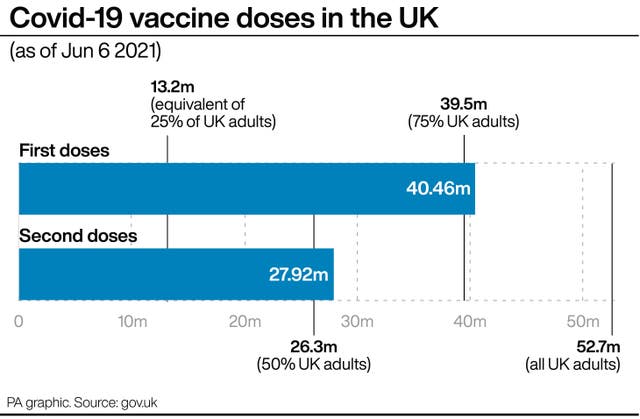
The analysis has been compiled by the PA news agency using Public Health England data published on Sunday on the Government’s coronavirus dashboard.
Data for the most recent four days (June 3-6) has been excluded as it is incomplete and does not reflect the true number of cases.
Mr Hancock told MPs: “No one wants our freedoms to be restricted a single day longer than is necessary.
“I know the impact that these restrictions have on the things we love, on our businesses, on our mental health.
“It is still too early to make decisions on Step 4. The road map has always been guided by the data and, as before, we need four weeks between steps to see the latest data and a further week to give notice of our decision.
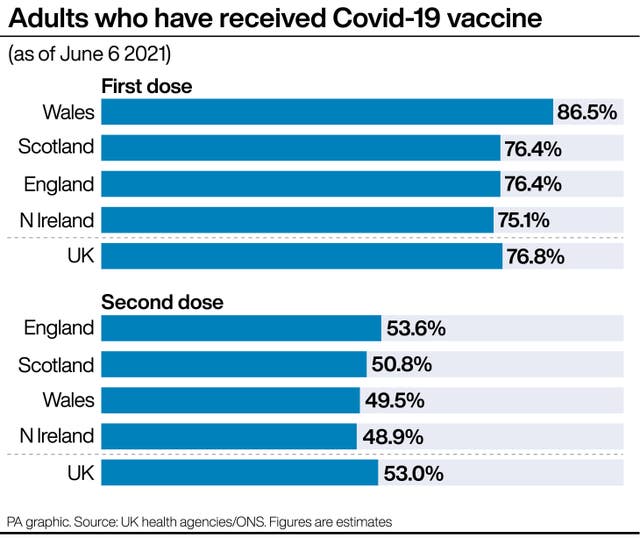
“I know that these restrictions have not been easy and with our vaccine programme moving at such pace I’m confident that one day soon freedom will return.”
Downing Street said data emerging over the coming week will be “crucial” in deciding whether England’s legal coronavirus restrictions can end as hoped on June 21.
The Prime Minister’s official spokesman said: “There still remains that there is nothing in the data currently to suggest Step 4 can’t go ahead at the earliest date.
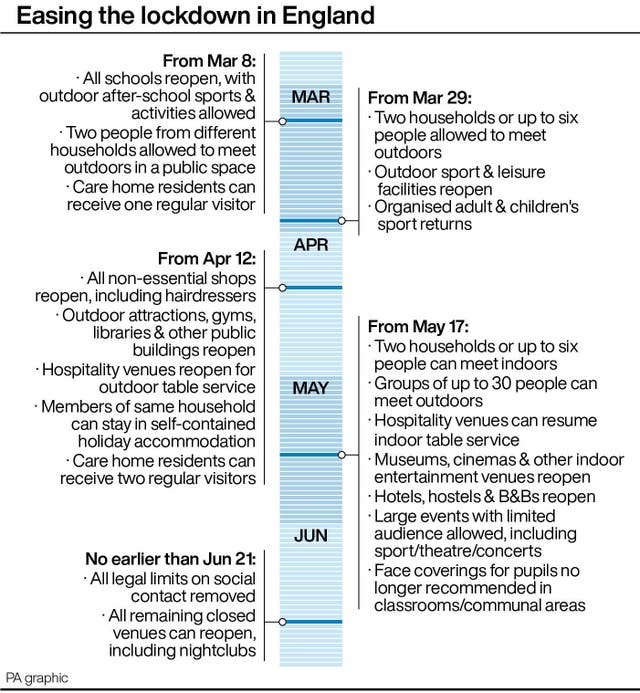
“But we do need to look very closely at the data over this coming week, which will be crucial to decide and really to get a sense of the data, particularly on hospitalisations and whether or not the excellent vaccine rollout programme has sufficiently severed that link between the increase in cases, which we always expected to happen, particularly after Step 3, and that subsequently leading to hospitalisations and deaths.”
In other developments:
– Surge testing was deployed in parts of Calderdale in response to cases of the Delta variant.
We are deploying additional testing in targeted areas of Calderdale where cases of the Delta #COVID19 variant have been found.
Everyone aged 12 and over in these areas should take a PCR test:▶️Todmorden▶️Park▶️Warley
More info➡️ https://t.co/4wUUBL0LJs pic.twitter.com/NO42sR2uF0
— Department of Health and Social Care (@DHSCgovuk) June 7, 2021
– Holidaymakers scrambled to return home from Portugal before new quarantine rules apply from 4am on Tuesday.
– All adults in Wales will be offered a coronavirus vaccine by next Monday, First Minister Mark Drakeford said.
– Data up to June 6 shows that 40,460,576 people have had at least one dose of vaccine – a rise of 127,345 on the previous day – while 27,921,294 have had a second dose, an increase of 259,941.
– One more person had died within 28 days of testing positive for Covid-19 as of Monday, bringing the UK total by that measure to 127,841.
– The Government also said that, as of 9am on Monday, there had been a further 5,683 lab-confirmed cases in the UK.




Comments: Our rules
We want our comments to be a lively and valuable part of our community - a place where readers can debate and engage with the most important local issues. The ability to comment on our stories is a privilege, not a right, however, and that privilege may be withdrawn if it is abused or misused.
Please report any comments that break our rules.
Read the rules here